#amazon merger
Explore tagged Tumblr posts
Text
Why they're smearing Lina Khan

My god, they sure hate Lina Khan. This once-in-a-generation, groundbreaking, brilliant legal scholar and fighter for the public interest, the slayer of Reaganomics, has attracted more vitriol, mockery, and dismissal than any of her predecessors in living memory.
She sure must be doing something right, huh?
A quick refresher. In 2017, Khan — then a law student — published Amazon’s Antitrust Paradox in the Yale Law Journal. It was a brilliant, blistering analysis showing how the Reagan-era theory of antitrust (which celebrates monopolies as “efficient”) had failed on its own terms, using Amazon as Exhibit A of the ways in which post-Reagan antitrust had left Americans vulnerable to corporate abuse:
https://www.yalelawjournal.org/note/amazons-antitrust-paradox
The paper sent seismic shocks through both legal and economic circles, and goosed the neo-Brandeisian movement (sneeringly dismissed as “hipster antitrust”). This movement is a rebuke to Reaganomics, with its celebration of monopolies, trickle-down, offshoring, corporate dark money, revolving-door regulatory capture, and companies that are simultaneously too big to fail and too big to jail.
This movement has many proponents, of course — not just Khan — but Khan’s careful scholarship, combined with her encyclopedic knowledge of the long-dormant statutory powers that federal agencies had to make change, and a strategy for reviving those powers to protect Americans from corporate predators made her a powerful, inspirational figure.
When Joe Biden won the 2020 presidential election, he surprised everyone by appointing Khan to the FTC. It wasn’t just that she had such a radical vision — it was also that she lacked the usual corporate law experience that such an appointee would normally require (experience that would ensure that the FTC was helmed by people whose default view of the world is that it should be structured and regulated by powerful, wealthy people in corporate boardrooms).
Even more surprising was that Khan was made chair of the FTC, something that was only possible because a few Republican Senators broke with their party to support her candidacy:
https://www.senate.gov/legislative/LIS/roll_call_votes/vote1171/vote_117_1_00233.htm
These Republicans saw in Khan an ally in their fight against “woke” Big Tech. For these senators, the problem wasn’t that tech had got too big and powerful — it was that there were a few limited instances in which tech leaders failed to wield that power in the ways they preferred.
The Republican project is a matter of getting turkeys to vote for Christmas by doing a lot of culture war bullshit, cruelly abusing disfavored sexual and racial minorities. This wins support from low-information voters who’ll vote against their class interests and support more monopolies, more tax cuts for the rich, and more cuts to the services they rely on.
But while tech leaders are 100% committed to the project of permanent oligarchic takeover of every sphere of American life, they are less full-throated in their support for hateful, cruel discrimination against disfavored minorities (in this regard, tech leaders resemble the corporate wing of the Democrats, which is where we get the “Silicon Valley is a Democratic Party stronghold” narrative).
This failure to unquestioningly and unstintingly back culture war bullshit put tech leaders in the GOP’s crosshairs. Some GOP politicians actually believe in the culture war bullshit, and are grossly offended that tech is “woke.” Others are smart enough not to get high on their own supply, but worry that any tech obstruction in the bullshit culture wars will make it harder to get sufficient turkey votes for a big fat Christmas surprise.
Biden’s ceding of antitrust policy to the left wing of the party, combined with disaffected GOP senators viewing Khan as their enemy’s enemy, led to Khan’s historic appointment as FTC Chair. In that position, she was joined by a slate of Biden trustbusters, including Jonathan Kanter at the DoJ Antitrust Division, Tim Wu at the White House, and other important, skilled and principled fighters like Alvaro Bedoya (FTC), Rebecca Slaughter (FTC), Rohit Chopra (CFPB), and many others.
Crucially, these new appointees weren’t just principled, they were good at their jobs. In 2021, Tim Wu wrote an executive order for Biden that laid out 72 concrete ways in which the administration could act — with no further Congressional authorization — to blunt corporate power and insulate the American people from oligarchs’ abusive and extractive practices:
https://pluralistic.net/2021/08/13/post-bork-era/#manne-down
Since then, the antitrust arm of the Biden administration have been fuckin’ ninjas, Getting Shit Done in ways large and small, working — for the first time since Reagan — to protect Americans from predatory businesses:
https://pluralistic.net/2022/10/18/administrative-competence/#i-know-stuff
This is in marked contrast to the corporate Dems’ champions in the administration. People like Pete Buttigieg are heralded as competent technocrats, “realists” who are too principled to peddle hopium to the base, writing checks they can’t cash. All this is cover for a King Log performance, in which Buttigieg’s far-reaching regulatory authority sits unused on a shelf while a million Americans are stranded over Christmas and whole towns are endangered by greedy, reckless rail barons straight out of the Gilded Age:
https://pluralistic.net/2023/01/10/the-courage-to-govern/#whos-in-charge
The contrast between the Biden trustbusters and their counterparts from the corporate wing is stark. While the corporate wing insists that every pitch is outside of the zone, Khan and her allies are swinging for the stands. They’re trying to make life better for you and me, by declaring commercial surveillance to be an unfair business practice and thus illegal:
https://pluralistic.net/2022/08/12/regulatory-uncapture/#conscious-uncoupling
And by declaring noncompete “agreements” that shackle good workers to shitty jobs to be illegal:
https://pluralistic.net/2022/02/02/its-the-economy-stupid/#neofeudal
And naturally, this has really pissed off all the right people: America’s billionaires and their cheerleaders in the press, government, and the hive of scum and villainy that is the Big Law/thinktank industrial-complex.
Take the WSJ: since Khan took office, they have published 67 vicious editorials attacking her and her policies. Khan is living rent-free in Rupert Murdoch’s head. Not only that, he’s given her the presidential suite! You love to see it.
These attacks are worth reading, if only to see how flimsy and frivolous they are. One major subgenre is that Khan shouldn’t be bringing any action against Amazon, because her groundbreaking scholarship about the company means she has a conflict of interest. Holy moly is this a stupid thing to say. The idea that the chair of an expert agency should recuse herself because she is an expert is what the physicists call not even wrong.
But these attacks are even more laughable due to who they’re coming from: people who have the most outrageous conflicts of interest imaginable, and who were conspicuously silent for years as the FTC’s revolving door admitted the a bestiary of swamp-creatures so conflicted it’s a wonder they managed to dress themselves in the morning.
Writing in The American Prospect, David Dayen runs the numbers:
Since the late 1990s, 31 out of 41 top FTC officials worked directly for a company that has business before the agency, with 26 of them related to the technology industry.
https://prospect.org/economy/2023-06-23-attacks-lina-khans-ethics-reveal-projection/
Take Christine Wilson, a GOP-appointed FTC Commissioner who quit the agency in a huff because Khan wanted to do things for the American people, and not their self-appointed oligarchic princelings. Wilson wrote an angry break-up letter to Khan that the WSJ published, presaging their concierge service for Samuel Alito:
https://www.wsj.com/articles/why-im-resigning-from-the-ftc-commissioner-ftc-lina-khan-regulation-rule-violation-antitrust-339f115d
For Wilson to question Khan’s ethics took galactic-scale chutzpah. Wilson, after all, is a commissioner who took cash money from Bristol-Myers Squibb, then voted to approve their merger with Celgene:
https://www.documentcloud.org/documents/4365601-Wilson-Christine-Smith-final278.html
Or take Wilson’s GOP FTC predecessor Josh Wright, whose incestuous relationship with the companies he oversaw at the Commission are so intimate he’s practically got a Habsburg jaw. Wright went from Google to the US government and back again four times. He also lobbied the FTC on behalf of Qualcomm (a major donor to Wright’s employer, George Mason’s Antonin Scalia Law School) after working “personally and substantially” while serving at the FTC.
George Mason’s Scalia center practically owns the revolving door, counting fourteen FTC officials among its affliates:
https://campaignforaccountability.org/ttp-investigation-big-techs-backdoor-to-the-ftc/
Since the 1990s, 31 out of 41 top FTC officials — both GOP appointed and appointees backed by corporate Dems — “worked directly for a company that has business before the agency”:
https://www.citizen.org/article/ftc-big-tech-revolving-door-problem-report/
The majority of FTC and DoJ antitrust lawyers who served between 2014–21 left government service and went straight to work for a Big Law firm, serving the companies they’d regulated just a few months before:
https://therevolvingdoorproject.org/wp-content/uploads/2022/06/The-Revolving-Door-In-Federal-Antitrust-Enforcement.pdf
Take Deborah Feinstein, formerly the head of the FTC’s Bureau of Competition, now a partner at Arnold & Porter, where she’s represented General Electric, NBCUniversal, Unilever, and Pepsi and a whole medicine chest’s worth of pharma giants before her former subordinates at the FTC. Michael Moiseyev who was assistant manager of FTC Competition is now in charge of mergers at Weil Gotshal & Manges, working for Microsoft, Meta, and Eli Lilly.
There’s a whole bunch more, but Dayen reserves special notice for Andrew Smith, Trump’s FTC Consumer Protection boss. Before he was put on the public payroll, Smith represented 120 clients that had business before the Commission, including “nearly every major bank in America, drug industry lobbyist PhRMA, Uber, Equifax, Amazon, Facebook, Verizon, and a variety of payday lenders”:
https://www.citizen.org/sites/default/files/andrew_smith_foia_appeal_response_11_30.pdf
Before Khan, in other words, the FTC was a “conflict-of-interest assembly line, moving through corporate lawyers and industry hangers-on without resistance for decades.”
Khan is the first FTC head with no conflicts. This leaves her opponents in the sweaty, desperate position of inventing conflicts out of thin air.
For these corporate lickspittles, Khan’s “conflict” is that she has a point of view. Specifically, she thinks that the FTC should do its job.
This makes grifters like Jim Jordan furious. Yesterday, Jordan grilled Khan in a hearing where he accused her of violating an ethics official’s advice that she should recuse herself from Big Tech cases. This is a talking point that was created and promoted by Bloomberg:
https://www.bloomberg.com/news/articles/2023-06-16/ftc-rejected-ethics-advice-for-khan-recusal-on-meta-case
That ethics official, Lorielle Pankey, did not, in fact, make this recommendation. It’s simply untrue (she did say that Khan presiding over cases that she has made public statements about could be used as ammo against her, but did not say that it violated any ethical standard).
But there’s more to this story. Pankey herself has a gigantic conflict of interest in this case, including a stock portfolio with $15,001 and $50,000 in Meta stock (Meta is another company that has whined in print and in its briefs that it is a poor defenseless lamb being picked on by big, mean ole Lina Khan):
https://www.wsj.com/articles/ethics-official-owned-meta-stock-while-recommending-ftc-chair-recuse-herself-from-meta-case-8582a83b
Jordan called his hearing on the back of this fake scandal, and then proceeded to show his whole damned ass, even as his GOP colleagues got into a substantive and even informative dialog with Khan:
https://prospect.org/power/2023-07-14-jim-jordan-misfires-attacks-lina-khan/
Mostly what came out of that hearing was news about how Khan is doing her job, working on behalf of the American people. For example, she confirmed that she’s investigating OpenAI for nonconsensually harvesting a mountain of Americans’ personal information:
https://www.ft.com/content/8ce04d67-069b-4c9d-91bf-11649f5adc74
Other Republicans, including confirmed swamp creatures like Matt Gaetz, ended up agreeing with Khan that Amazon Ring is a privacy dumpster-fire. Nobodies like Rep TomM assie gave Khan an opening to discuss how her agency is protecting mom-and-pop grocers from giant, price-gouging, greedflation-drunk national chains. Jeff Van Drew gave her a chance to talk about the FTC’s war on robocalls. Lance Gooden let her talk about her fight against horse doping.
But Khan’s opponents did manage to repeat a lot of the smears against her, and not just the bogus conflict-of-interest story. They also accused her of being 0–4 in her actions to block mergers, ignoring the huge number of mergers that have been called off or not initiated because M&A professionals now understand they can no longer expect these mergers to be waved through. Indeed, just last night I spoke with a friend who owns a medium-sized tech company that Meta tried to buy out, only to withdraw from the deal because their lawyers told them it would get challenged at the FTC, with an uncertain outcome.
These talking points got picked up by people commenting on Judge Jacqueline Scott Corley’s ruling against the FTC in the Microsoft-Activision merger. The FTC was seeking an injunction against the merger, and Corley turned them down flat. The ruling was objectively very bad. Start with the fact that Corley’s son is a Microsoft employee who stands reap massive gains in his stock options if the merger goes through.
But beyond this (real, non-imaginary, not manufactured conflict of interest), Corley’s judgment and her remarks in court were inexcusably bad, as Matt Stoller writes:
https://www.thebignewsletter.com/p/judge-rules-for-microsoft-mergers
In her ruling, Corley explained that she didn’t think Microsoft would abuse the market dominance they’d gain by merging their giant videogame platform and studio with one of its largest competitors. Why not? Because Microsoft’s execs pinky-swore that they wouldn’t abuse that power.
Corely’s deference to Microsoft’s corporate priorities goes deeper than trusting its execs, though. In denying the FTC’s motion, she stated that it would be unfair to put the merger on hold in order to have a full investigation into its competition implications because Microsoft and Activision had set a deadline of July 18 to conclude things, and Microsoft would have to pay a penalty if that deadline passed.
This is surreal: a judge ruled that a corporation’s radical, massive merger shouldn’t be subject to full investigation because that corporation itself set an arbitrary deadline to conclude the deal before such an investigation could be concluded. That’s pretty convenient for future mega-mergers — just set a short deadline and Judge Corely will tell regulators that the merger can’t be investigated because the deadline is looming.
And this is all about the future. As Stoller writes, Microsoft isn’t exactly subtle about why it wants this merger. Its own execs said that the reason they were spending “dump trucks” of money buying games studios was to “spend Sony out of business.”
Now, maybe you hate Sony. Maybe you hate Activision. There’s plenty of good reason to hate both — they’re run by creeps who do shitty things to gamers and to their employees. But if you think that Microsoft will be better once it eliminates its competition, then you have the attention span of a goldfish on Adderall.
Microsoft made exactly the same promises it made on Activision when it bought out another games studio, Zenimax — and it broke every one of those promises.
Microsoft has a long, long, long history of being a brutal, abusive monopolist. It is a convicted monopolist. And its bad conduct didn’t end with the browser wars. You remember how the lockdown turned all our homes into rent-free branch offices for our employers? Microsoft seized on that moment to offer our bosses keystroke-and-click level surveillance of our use of our own computers in our own homes, via its Office365 bossware product:
https://pluralistic.net/2020/11/25/the-peoples-amazon/#clippys-revenge
If you think a company that gave your boss a tool to spy on their employees and rank them by “productivity” as a prelude to firing them or cutting their pay is going to treat gamers or game makers well once they have “spent the competition out of business,” you’re a credulous sucker and you are gonna be so disappointed.
The enshittification play is obvious: use investor cash to make things temporarily nice for customers and suppliers, lock both of them in — in this case, it’s with a subscription-based service similar to Netflix’s — and then claw all that value back until all that’s left is a big pile of shit.
The Microsoft case is about the future. Judge Corely doesn’t take the future seriously: as she said during the trial, “All of this is for a shooter videogame.” The reason Corely greenlit this merger isn’t because it won’t be harmful — it’s because she doesn’t think those harms matter.
But it does, and not just because games are an art form that generate billions of dollars, employ a vast workforce, and bring pleasure to millions. It also matters because this is yet another one of the Reaganomic precedents that tacitly endorses monopolies as efficient forces for good. As Stoller writes, Corley’s ruling means that “deal bankers are sharpening pencils and saying ‘Great, the government lost! We can get mergers through everywhere else.’ Basically, if you like your high medical prices, you should be cheering on Microsoft’s win today.”
Ronald Reagan’s antitrust has colonized our brains so thoroughly that commentators were surprised when, immediately after the ruling, the FTC filed an appeal. Don’t they know they’ve lost? the commentators said:
https://gizmodo.com/ftc-files-appeal-of-microsoft-activision-deal-ruling-1850640159
They echoed the smug words of insufferable Activision boss Mike Ybarra: “Your tax dollars at work.”
https://twitter.com/Qwik/status/1679277251337277440
But of course Khan is appealing. The only reason that’s surprising is that Khan is working for us, the American people, not the giant corporations the FTC is supposed to be defending us from. Sure, I get that this is a major change! But she needs our backing, not our cheap cynicism.
The business lobby and their pathetic Renfields have hoarded all the nice things and they don’t want us to have any. Khan and her trustbuster colleagues want the opposite. There is no measure so small that the corporate world won’t have a conniption over it. Take click to cancel, the FTC’s perfectly reasonable proposal that if you sign up for a recurring payment subscription with a single click, you should be able to cancel it with a single click.
The tooth-gnashing and garment-rending and scenery-chewing over this is wild. America’s biggest companies have wheeled out their biggest guns, claiming that if they make it too easy to unsubscribe, they will lose money. In other words, they are currently making money not because people want their products, but because it’s too hard to stop paying for them!
https://www.theregister.com/2023/07/12/ftc_cancel_subscriptions/
We shouldn’t have to tolerate this sleaze. And if we back Khan and her team, they’ll protect us from these scams. Don’t let them convince you to give up hope. This is the start of the fight, not the end. We’re trying to reverse 40 years’ worth of Reagonmics here. It won’t happen overnight. There will be setbacks. But keep your eyes on the prize — this is the most exciting moment for countering corporate power and giving it back to the people in my lifetime. We owe it to ourselves, our kids and our planet to fight one.

If you’d like an essay-formatted version of this post to read or share, here’s a link to it on pluralistic.net, my surveillance-free, ad-free, tracker-free blog:
https://pluralistic.net/2023/07/14/making-good-trouble/#the-peoples-champion

[Image ID: A line drawing of pilgrims ducking a witch tied to a ducking stool. The pilgrims' clothes have been emblazoned with the logos for the WSJ, Microsoft, Activision and Blizzard. The witch's face has been replaced with that of FTC chair Lina M Khan.]
#pluralistic#amazon's antitrust paradox#lina khan#business lobby#lina m khan#ftc#federal trade commission#david dayen#microsoft#activision#blizzard#wsj#wall street journal#reaganomics#trustbusting#antitrust#mergers#merger to monopoly#gaming#xbox#matt stoller#the american prospect#jim jordan#click to cancel#robert bork#Judge Jacqueline Scott Corley#microsoft activision#fuckin' ninjas
6K notes
·
View notes
Text
Saks Global: Neiman Marcus, Bergdorf Goodman and Amazon
Saks Global: Neiman Marcus, Bergdorf Goodman and Amazon #news #business #fashion
What happens when you blend luxury retail giants, a pandemic and the rise of e-commerce? You get the new Saks Global. That is, I’m sure you may have heard by now that Saks Fifth Avenue bought Neiman Marcus for $2.65 billion dollars. Amazon has thrown their weight around joining the merger as they have tried brick-and-mortar stores Amazon Style to no success. Amazon will probably help streamline…
#Amazon#Bergdorf Goodman#E-Commerce#luxury retail#Merger#Neiman Marcus#Saks Fifth Avenue#Saks Global#Whole Foods
0 notes
Text
🗣️THIS IS WHAT INCLUSIVE, COMPASSIONATE DEMOCRACY LOOKS LIKE
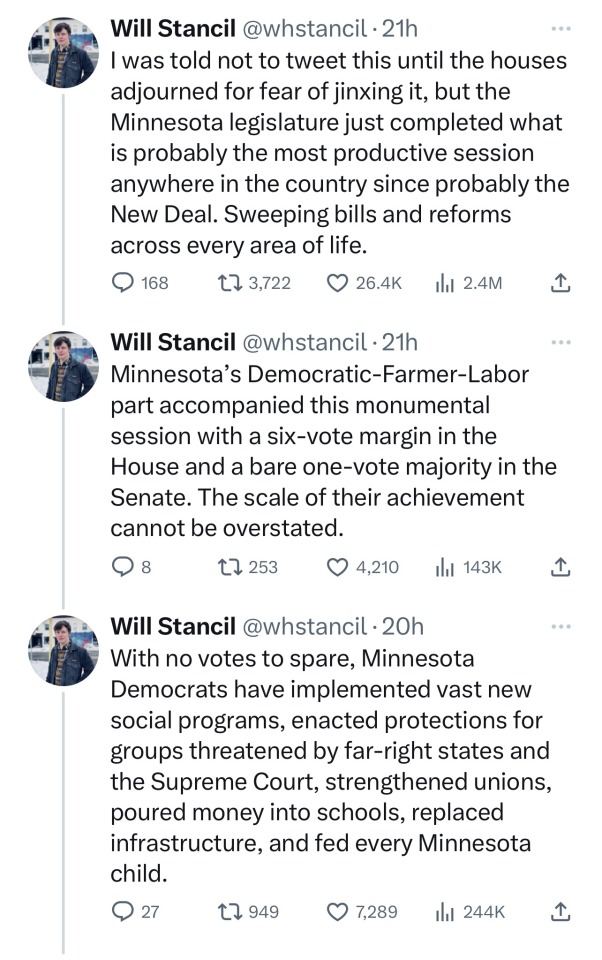
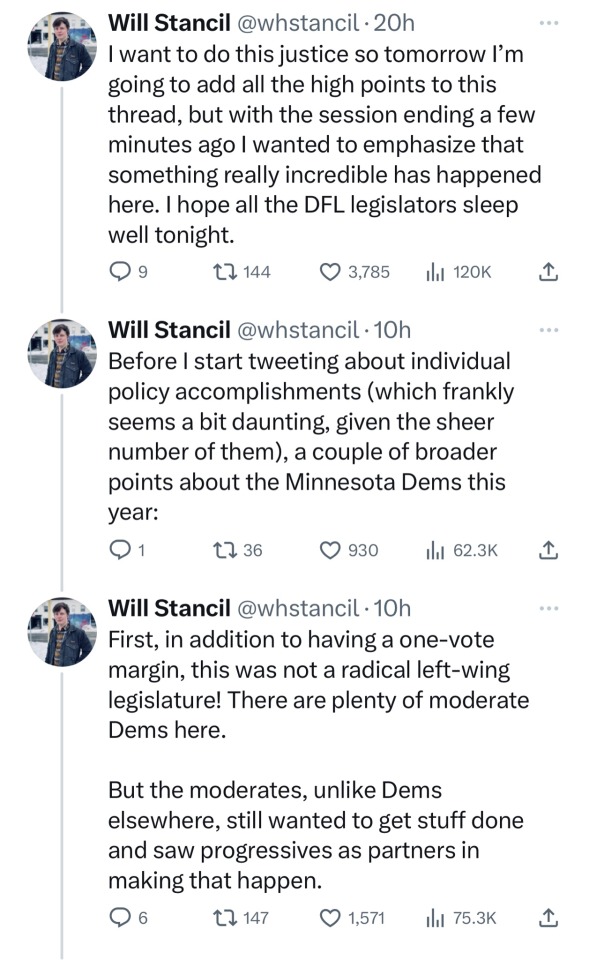
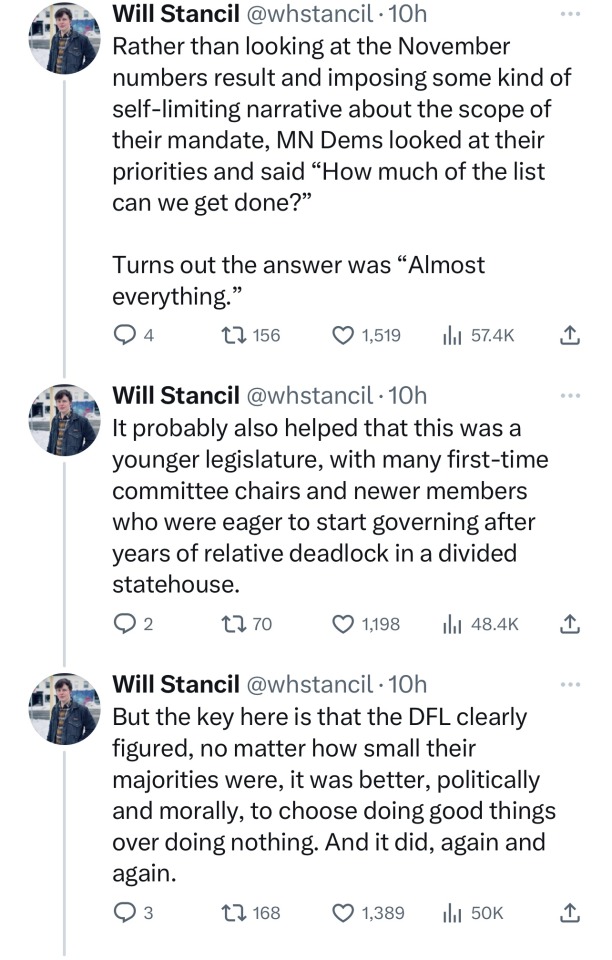
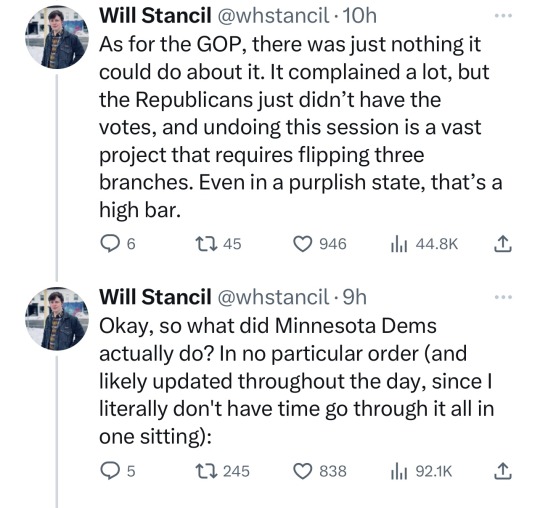
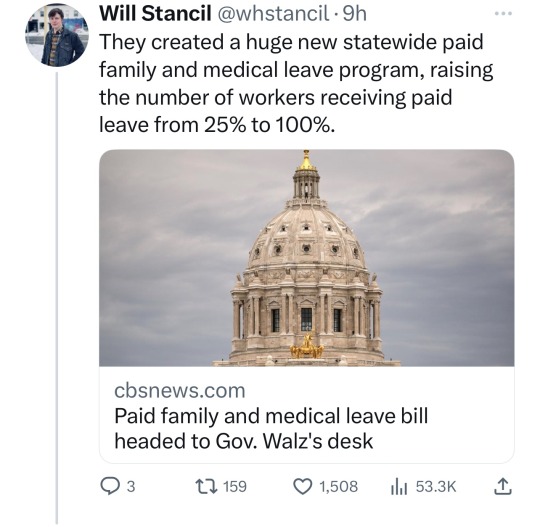


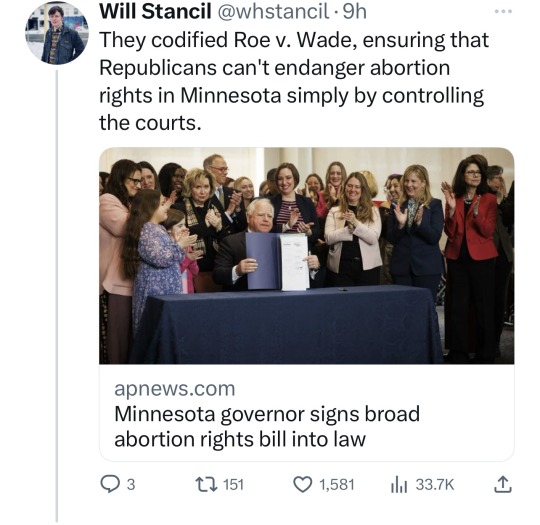

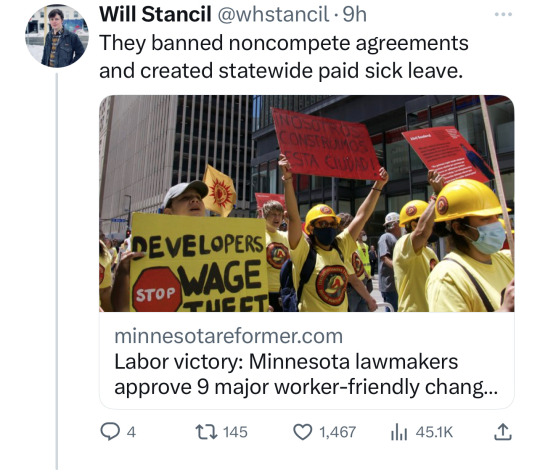
Minnesota Dems enacted a raft of laws to make the state a trans refuge, and ensure people receiving trans care here can't be reached by far-right governments in places like Florida and Texas. (link)
Minnesota Dems ensured that everyone, including undocumented immigrants, can get drivers' licenses. (link)
They made public college free for the majority of Minnesota families. (link)
Minnesota Dems dropped a billion dollars into a bevy of affordable housing programs, including by creating a new state housing voucher program. (link)
Minnesota Dems massively increased funding for the state's perpetually-underfunded public defenders, which lets more public defenders be hired and existing public defenders get a salary increase. (link)
Dems raised Minnesota education spending by 10%, or about 2.3 billion. (link)
Minnesota Dems created an energy standard for 100% carbon-free electricity by 2040. (link)
Minnesota already has some of the strongest election infrastructure (and highest voter participation) in the country, but the legislature just made it stronger, with automatic registration, preregistration for minors, and easier access to absentee ballots. (link)
Minnesota Dems expanded the publicly subsidized health insurance program to undocumented immigrants. This one's interesting because it's the sort of things Dems often balk at. The governor opposed it! The legislature rolled over him and passed it anyway. (link)
Minnesota Dems expanded background checks and enacted red-flag laws, passing gun safety measures that the GOP has thwarted for years. (link)
Minnesota Dems gave the state AG the power to block the huge healthcare mergers that have slowly gobbled up the state's medical system. (link)
Minnesota Dems restored voting rights to convicted felons as soon as they leave prison. (link)
Minnesota Dems made prison phone calls free. (link)
Minnesota Dems passed new wage protection rules for the construction industry, against industry resistance. (link)
Minnesota Dems created a new sales tax to fund bus and train lines, an enormous victory for the sustainability and quality of public transit. Transit be more pleasant to ride, more frequent, and have better shelters, along more lines. (link)
They passed strict new regulations on PFAS ("forever chemicals"). (link)
Minnesota Dems passed the largest bonding bill in state history! Funding improvements to parks, colleges, water infrastructure, bridges, etc. etc. etc. (link)
They're going to build a passenger train from the Twin Cities to Duluth. (link)
I can't even find a news story about it but there's tens of millions in funding for new BRT lines, too. (link)
A wonky-but-important change: Minnesota Dems indexed the state gas tax to inflation, effectively increasing the gas tax. (link)
They actually indexed a bunch of stuff to inflation, including the state's education funding formula, which helps ensure that school spending doesn't decline over time. (link)
Minnesota Dems made hourly school workers (e.g., bus drivers and paraprofessionals) eligible for unemployment during summer break, when they're not working or getting paid. (link)
Minnesota Dems passed a bunch of labor protections for teachers, including requiring school districts to negotiate class sizes as part of union contracts. (Yet another @SydneyJordanMN special here. (link)
Minnesota Dems created a state board to govern labor standards at nursing homes. (link)
Minnesota Dems created a Prescription Drug Affordability Board, which would set price caps for high-cost pharmaceuticals. (link)
Minnesota Dems created new worker protections for Amazon warehouse workers and refinery workers. (link)
Minnesota Dems passed a digital fair repair law, which requires electronics manufacturers to make tools and parts available so that consumers can repair their electronics rather than purchase new items. (link)
Minnesota Dems made Juneteenth a state holiday. (link)
Minnesota Dems banned conversion therapy. (link)
They spent nearly a billion dollars on a variety of environmental programs, from heat pumps to reforestation. (link)
Minnesota Dems expanded protections for pregnant and nursing workers - already in place for larger employers - to almost everyone in the state. (link)
Minnesota Dems created a new child tax credit that will cut child poverty by about a quarter. (link)
Minnesota Democrats dropped a quick $50 million into homelessness prevention programs. (link)
And because the small stuff didn't get lost in the big stuff, they passed a law to prevent catalytic converter thefts. (link)
Minnesota Dems increased child care assistance. (link)
Minnesota Dems banned "captive audience meetings," where employers force employees to watch anti-union presentations. (link)
No news story yet, but Minnesota Dems forced signal priority changes to Twin Cities transit. Right now the trains have to wait at intersections for cars, which, I can say from experience, is terrible. Soon that will change.
Minnesota Dems provided the largest increase to nursing home funding in state history. (link)
They also bumped up salaries for home health workers, to help address the shortage of in-home nurses. (link)
Minnesota Dems legalized drug paraphernalia, which allows social service providers to conduct needle exchanges and address substance abuse with reduced fear of incurring legal action. (link)
Minnesota Dems banned white supremacists and extremists from police forces, capped probation at 5 years for most crimes, improved clemency, and mostly banned no-knock warrants. (link)
Minnesota Dems also laid the groundwork for a public health insurance option. (link)
I’m happy for the people of Minnesota, but as a Floridian living under Ron DeSantis & hateful Republicans, I’m also very envious tbh. We know that democracy can work, and this is a shining example of what government could be like in the hands of legislators who actually care about helping people in need, and not pursuing the GOP’s “culture wars” and suppressing the votes of BIPOC, and inflicting maximum harm on those who aren’t cis/het, white, wealthy, Christian males. BRAVO MINNESOTA. This is how you do it! And the Minnesota Dems did it with a one seat majority, so no excuses. Forget about the next election and focus on doing as much good as you can, while you still can. 👏🏿👏🏿👏🏿👏🏿👏🏿👏🏿👏🏿
👉🏿 https://threadreaderapp.com/thread/1660846689450688514.html
#politics#minnesota#social justice#culture wars#this is what democracy looks like#republicans are evil
25K notes
·
View notes
Video
youtube
Who’s to Blame for Out-Of-Control Corporate Power?
One man is especially to blame for why corporate power is out of control. And I knew him! He was my professor, then my boss. His name… Robert Bork.
Robert Bork was a notorious conservative who believed the only legitimate purpose of antitrust — that is, anti-monopoly — law is to lower prices for consumers, no matter how big corporations get. His philosophy came to dominate the federal courts and conservative economics.
I met him in 1971, when I took his antitrust class at Yale Law School. He was a large, imposing man, with a red beard and a perpetual scowl. He seemed impatient and bored with me and my classmates, who included Bill Clinton and Hillary Rodham, as we challenged him repeatedly on his antitrust views.
We argued with Bork that ever-expanding corporations had too much power. Not only could they undercut rivals with lower prices and suppress wages, but they were using their spoils to influence our politics with campaign contributions. Wasn’t this cause for greater antitrust enforcement?
He had a retort for everything. Undercutting rival businesses with lower prices was a good thing because consumers like lower prices. Suppressing wages didn’t matter because employees are always free to find better jobs. He argued that courts could not possibly measure political power, so why should that matter?
Even in my mid-20s, I knew this was hogwash.
But Bork’s ideology began to spread. A few years after I took his class, he wrote a book called The Antitrust Paradox summarizing his ideas. The book heavily influenced Ronald Reagan and later helped form a basic tenet of Reaganomics — the bogus theory that says government should get out of the way and allow corporations to do as they please, including growing as big and powerful as they want.
Despite our law school sparring, Bork later gave me a job in the Department of Justice when he was solicitor general for Gerald Ford. Even though we didn’t agree on much, I enjoyed his wry sense of humor. I respected his intellect. Hell, I even came to like him.
Once President Reagan appointed Bork as an appeals court judge, his rulings further dismantled antitrust. And while his later Supreme Court nomination failed, his influence over the courts continued to grow.
Bork’s legacy is the enormous corporate power we see today, whether it’s Ticketmaster and Live Nation consolidating control over live performances, Kroger and Albertsons dominating the grocery market, or Amazon, Google, and Meta taking over the tech world.
It’s not just these high-profile companies either: in most industries, a handful of companies now control more of their markets than they did twenty years ago.
This corporate concentration costs the typical American household an estimated extra $5,000 per year. Companies have been able to jack up prices without losing customers to competitors because there is often no meaningful competition.
And huge corporations also have the power to suppress wages because workers have fewer employers from whom to get better jobs.
And how can we forget the massive flow of money these corporate giants are funneling into politics, rigging our democracy in their favor?
But the tide is beginning to turn under the Biden Administration. The Justice Department and Federal Trade Commission are fighting the monopolization of America in court, and proposing new merger guidelines to protect consumers, workers, and society.
It’s the implementation of the view that I and my law school classmates argued for back in the 1970s — one that sees corporate concentration as a problem that outweighs any theoretical benefits Bork claimed might exist.
Robert Bork would likely regard the Biden administration’s antitrust efforts with the same disdain he had for my arguments in his class all those years ago. But instead of a few outspoken law students, Bork’s philosophy is now being challenged by the full force of the federal government.
The public is waking up to the outsized power corporations wield over our economy and democracy. It’s about time.
2K notes
·
View notes
Text
Discovery+
New Post has been published on https://hazirbilgi.com/what-is-discovery-what-are-their-contents/
Discovery+
What is Discovery+? What are their contents?
Discovery+ (Discovery Plus) is an online streaming platform. Discovery Inc. It offers an online digital content publishing service developed and commissioned by
Discovery is a paid online streaming platform serving on a monthly subscription basis. Discovery Inc. It is a streaming service that brings together the contents of channels and broadcasting platforms and broadcasts original series and programs.
Discovery+ history
Discovery+ content platform launched in 2020. It was put into service for the first time in the Indian market. Before the end of 2020 , it revised its Dplay service , which serves the European continent , and put it into service in Europe with the “Discovery+” brand. Discovery+ debuted in the US in early 2021.
It has grown in a short time in the global market. In August 2021, it managed to exceed 18 million subscribers. The service was launched in Canada in October 2021. Discovery Inc. has published a program regarding the countries where Discovery+ will be put into service in the global market.
The company works with publishing partners for different regions and countries. As of May 2021, Discovery+ entered the Turkish market in partnership with BluTV .
Discovery+ can be accessed via web browsers on Windows , MacOS and Linux operating systems. It also has mobile support/compatibility. There is a Discovery+ application developed specifically for Android and iOS mobile operating systems. Also available on digital media player platforms. It is also available on Xbox One and Xbox Series game consoles.
What are Discovery+ contents?
Discovery+ platform contents consist of original series and programs. In addition, within the body of Discovery Inc.; Content on “ TLC ”, “DMAX”, “ID”, “Discovery Science”, “Discovery Channel”, “Travel Channel”, “Animal Planet”, “Investigation Discovery” channels can also be accessed. It also features broadcast streams on “HGTV”, “Food Network”, “Asian Food Network” channels.
Discovery+ also includes the current content of broadcast partners based on country and region on the platform. Therefore, there may be different content depending on the country/region coverage of Discovery+. For example, in the USA , there is a special license agreement between Discovery+ and A&E Networks . Within the scope of this agreement, there are programs from the “Lifetime” and “History” channel contents. These programs are not included in the flow of other country/region coverages.
Discovery+ Eurosport deal
Discovery+ has signed an agreement with Eurosport for the European market . Channels and sports content on Eurosport networks can be watched on Discovery+ platforms in European countries.
Discovery+ Turkey
Discovery+, which entered the global market gradually, also entered the Turkish market in May 2021. Discovery+ has agreed with BluTV as a broadcast partner in Turkey. For this, Discovery company bought 35% of BluTV’s shares.
After the purchase, the contents of both digital broadcasting platforms were brought together. Discovery+ content is broadcast on BluTV. In addition, original content from BluTV is also broadcast on Discovery+’s platforms in other regions.
discovery+,star trek discovery,a discovery of witches,six flags discovery kingdom,land rover discovery,star trek discovery season 4,a discovery of witches season 3,star trek discovery cast,snake discovery,land rover discovery sport,warner bros discovery,discovery+ app,discovery+ account,discovery+ and hbo max,discovery+ annual subscription,discovery+ amazon,discovery+ amazon prime,discovery+ ad free,discovery+ app not working,discovery+ and hbo max merger,discovery+ app download,
#a discovery of witches#a discovery of witches season 3#discovery+#discovery+ account#discovery+ ad free#discovery+ amazon#discovery+ amazon prime#discovery+ and hbo max#discovery+ and hbo max merger#discovery+ annual subscription#discovery+ app#discovery+ app download#discovery+ app not working#land rover discovery#land rover discovery sport#six flags discovery kingdom#snake discovery#star trek discovery#star trek discovery cast#star trek discovery season 4#warner bros discovery
1 note
·
View note
Text
CALL TO ACTION to support WGA/SAG-AFTRA: Submit a comment about the corporate monopoly crisis.
August 18, 2023: You can personalize the template message included in the above link, or simply just add your name & email. Seems like it's US only; please boost if you can't sign yourself.
From the WGA:
"More than 100 days into our strike, as we continue to fight for the sustainability of our profession, events in Washington, D.C. provide an opportunity for writers to shine a light on one of the root causes of the strike: media consolidation. For decades, the WGA has advocated for stronger antitrust oversight, bringing attention to the ways that mergers and vertical integration in our industry – from AT&T-Time Warner to Warner Bros.-Discovery to Amazon-MGM to Disney-Fox – have consolidated the power of our employers and harmed writers as well as the diversity of content. In numerous reports and policy filings – including a new report called The New Gatekeepers: How Disney, Amazon and Netflix Will Take Over Media, released yesterday – the WGA has documented the threat to our industry from past and future consolidation and called for more aggressive antitrust enforcement. Our current strike highlights the urgency of the issue; studios gained power through anti-competitive consolidation and vertical integration and then used that power to push down wages and impose more precarious working conditions for writers while profiting off of their work, and currently – together – refuse to bargain a fair contract for writers to mitigate those harms. Last month, the FTC and DOJ jointly released proposed revisions to their Merger Guidelines, a policy document designed to guide law enforcement around consolidation. These new Draft Guidelines are part of an effort by these agencies to reinvigorate antitrust enforcement. Compared with prior versions of Merger Guidelines, they give significantly more weight to the ways that mergers can be harmful and, for the first time, explicitly direct agencies and courts to consider how mergers can hurt workers. The Draft Guidelines have been released for public comment, and the FTC and DOJ want to hear from people who have been affected by consolidation – people like you.”
The FTC and DOJ are accepting comments on their revisions of the Merger Guidelines until September 18.
#sag-aftra strike#sag strike#actors strike#fans4wga#union solidarity#wga strong#sag-aftra strong#i stand with the wga#wga strike#writers strike
2K notes
·
View notes
Text
JOURNALISTIC CHOICES: Telling the Truth vs. "Bothsidesism"
Ben Raderstorf does a great job in this article discussing the dilemma modern journalism has in covering a lying, dangerous authoritarian like Donald Trump, without "appearing partisan." Raderstorf argues against bothsidesism, and in favor of good journalists just simply telling the truth.
[T]he best way for independent, fact-based media to win back the audiences they’re losing to polarization is to not chase them.... But rather, to double-down on independence, objectivity, and honesty. To report reality as it is and to let the chips fall where they may. To draw a hard distinction between the normal political jockeying of healthy democracy and actions that threaten our system of government. Back in 2022, in response to questions from reporters about how to discern between those two things, we wrote a report on how experts understand threats to democracy: The Authoritarian Playbook: How reporters can contextualize and cover authoritarian threats as distinct from politics-as-usual.
"Modern autocrats don't crush journalism — they corrupt it."
Raderstorf also talks about how 21st century autocrats like Viktor Orbán (who is a role model for Trump) apply pressure in subtle ways to eventually "corrupt" journalism.
These days, many autocrats don’t just smash printing presses, throw reporters in jail, and be done with it. Often they pursue a more nuanced, and more insidious, strategy. With a combination of intimidation, coercion, and financial manipulation, they slowly corrode the independence and autonomy of the press until it ceases to be a meaningful check on power. The media still exists; it’s just an empty shell, a useful facade. Put differently, modern autocrats don’t crush journalism — they corrupt it.
[See more below the cut about the role of "anticipatory obedience" and the changes in leadership at CNN and The Washington Post.]
[edited]
"ANTICIPATORY OBEDIENCE": An Explanation for Why CNN and The Washington Post Changed Their Leadership
Raderstorf mentions how the two journalistic outlets that Trump targeted most vehemently as president are the two that eventually replaced their leadership--and as a result, weakened their journalistic integrity.
In an article this week in the Columbia Journalism Review, my colleagues Ian Bassin... and Maximillian Potter ... dive into several case studies. They connect troubling dots suggesting that Donald Trump deployed the Orbán strategy in his first term to greater effect than many realize. [...] In their piece, Ian and Max explore the two major instances in Trump’s first term when he attempted to wield the powers of the presidency against journalists for coverage he didn’t like. First, by threatening to block a proposed merger between CNN’s parent company, Time Warner, and AT&T. Second, by looking to raise shipping rates on Amazon, whose owner, Jeff Bezos, also owns the Washington Post. In both cases, Trump mostly failed to carry out his threats. But… it’s also true that both CNN and the Post subsequently went through high-profile leadership shakeups at least partly in response to Trump. For CNN, this was Chris Licht’s short-lived tenure and disastrous efforts to make the network “more neutral.” For the Post, it was Bezos installing a new publisher: “Will Lewis, a former Rupert Murdoch executive who has spent most of his career in right-wing media.” [...] Timothy Snyder writes in On Tyranny that autocratic leaders often succeed simply because the media, business leaders, and civil society look ahead to possible repression and move preemptively towards self-preservation. What he calls “anticipatory obedience."
#journalism#authoritarianism#trump#viktor orban#bothsidesism#telling the truth#anticipatory obedience#cnn#the washington post#ben raderstorf#if you can keep it
49 notes
·
View notes
Text
Over the past decade, deregulation and the growing dominance of streaming video have laid the groundwork for a media landscape where just three companies—Disney, Amazon, and Netflix—are poised to be the new gatekeepers. This report from the WGAW details how these three companies have amassed power through anticompetitive practices and abusing their dominance to further disadvantage competitors, raise prices for consumers, and push down wages for the creative workforce. Pay and working conditions for writers have become so dire, and media conglomerates so unresponsive, that 11,500 writers went on strike in May 2023. Without intervention from antitrust agencies and lawmakers, consolidation will continue to snowball, leaving the future of media in peril. These new gatekeepers have amassed market power through mergers and other anti-competitive practices, offering an alarming window into the future of media. Disney has grown through a series of multibillion-dollar acquisitions, using its power to reduce film output, shut down competing studios, foreclose independent content from its distribution networks, expand control of the labor market, and force creators to give up financial participation in future licensing revenue. Amazon has gained a sizeable footprint in media in a short time by utilizing the well-documented playbook critical to its ascendance as a tech company. Though anticompetitive behavior and vertical integration, Amazon has harmed competitors, privileged its related business, and abused employer leverage to underpay writers. Netflix was once an innovative competitor, but is now using its position as the largest streaming service in the world to abuse its leverage as an employer, decrease innovative content spending and raise prices for consumers. The company has cut out independent producers and severely underpaid writers in multiple areas, and a series of recent acquisitions signal its intent to further increase dominance and market power in order to reduce innovative content investment.
110 notes
·
View notes
Text
i hope rickrolling never dies
i'll be 89 living in the retirement home on my deathbed with all my family gathered round me and i'll beam rick astley into the AmazonSoft (that's their name after the Amazon-Microsoft merger of 2044) NeuroChat Chip in all my grandkids' heads before finally slipping off to sleep one last time
11 notes
·
View notes
Text
The super-rich got that way through monopolies

Catch me in Miami! I'll be at Books and Books in Coral Gables on Jan 22 at 8PM.

Just in time for Davos, here's 'Taken, not earned: How monopolists drive the world’s power and wealth divide," a report from a coalition of international tax justice and anti-corporate activist groups:
https://www.balancedeconomy.net/wp-content/uploads/2024/01/Davos-Taken-not-Earned-full-Report-2024-FINAL.pdf
The rise of monopolies over the past 40 years came about as the result of specific, deliberate policy choices. As the report documents, the wealthiest people in America funneled a fortune into neutering antitrust enforcement, through the "consumer welfare" doctrine.
This is an economic theory that equates monopolies with efficiency: "If everyone is buying the same things from the same store, that tells you the store is doing something right, not something criminal." 40 years ago, and ever since, the wealthy have funded think-tanks, university programs and even "continuing education" programs for federal judges to push this line:
https://pluralistic.net/2021/08/13/post-bork-era/#manne-down
They didn't do this for ideological reasons – they were chasing material goals. Monopolies produce vast profits, and those profits produce vast wealth. The rise and rise of the super rich cannot be decoupled from the rise and rise of monopolies.
If you're new to this, you might think that "monopoly" only refers to a sector in which there is only one seller. But that's not what economists mean when they talk about monopolies and monopolization: for them, a monopoly is a company with power. Economists who talk about monopolies mean companies that "can act independently without needing to consider the responses of competitors, customers, workers, or even governments."
One way to measure that power is through markups ("the difference between the selling price of goods or services and their cost"). Very large companies in concentrated industries have very high markups, and they're getting higher. From 2017-22, the 20 largest companies in the world had average markups of 50%. The 100 largest companies average 43%. The smallest half of companies get average markups of 25%.
Those markups rose steeply during the covid lockdowns – and so did the wealth of the billionaires who own them. Tech billionaires – Bezos, Brin and Page, Gates and Ballmer – all made their fortunes from monopolies. Warren Buffet is a proud monopolist who says "the single most important decision in evaluating a business is pricing power… if you have to have a prayer session before raising the price by 10 percent, then you’ve got a terrible business."
We are living in the age of the monopoly. In the 1930s, the top 0.1% of US companies accounted for less than half of America's GDP. Today, it's 90%. And it's accelerating, with global mergers climbing from 2,676 in 1985 to 62,000 in 2021.
Monopoly's cheerleaders claim that these numbers vindicate them. Monopolies are so efficient that everyone wants to create them. Those efficiencies can be seen in the markups monopolies can charge, and the profits they can make. If a monopoly has a 50% markup, that's just the "efficiency of scale."
But what is the actual shape of this "efficiency?" How is it manifest? The report's authors answer this with one word: power.
Monopolists have the power "to extract wealth from, to restrict the freedoms of, and to manipulate or steer the vastly larger numbers of losers." They establish themselves as gatekeepers and create chokepoints that they can use to raise prices paid by their customers and lower the payout to their suppliers:
https://chokepointcapitalism.com/
These chokepoints let monopolies usurp "one of the ultimate prerogatives of state power: taxation." Amazon sellers pay a 51% tax to sell on the platform. App Store suppliers pay a 30% tax on every dollar they make with their apps. That translates into higher costs. Consider a good that costs $10 to make: the bottom 50% of companies (by size) would charge $12.50 for that product on average. The largest companies would charge $15. Thus monopolies don't just make their owners richer – they make everyone else poorer, too.
This power to set prices is behind the greedflation (or, more politely, "seller's inflation"). The CEOs of the largest companies in the world keep getting on investor calls and bragging about this:
https://pluralistic.net/2023/03/11/price-over-volume/#pepsi-pricing-power
The food system is incredibly monopolistic. The Cargill family own the largest commodity trader in the world, which is how they built up a family fortune worth $43b. Cargill is one of the "ABCD" companies ("Archer Daniels Midland, Bunge, Cargill and Louis Dreyfus") that control the world's food supply, and they tripled their profits during the lockdown.
Monopolies gouge everyone – even governments. Pfizer charged the NHS £18-22/shot for vaccines that cost £5/shot to make. They took the British government for £2bn – that's enough to pay last year's pay hike for NHS nurses, six times over,
But monopolies also abuse their suppliers, especially their employees. All over the world, competition authorities are uncovering "wage fixing" and "no poaching" agreements among large firms, who collude to put a cap on what workers in their sector can earn. Unions report workers having their pay determined by algorithms. Bosses lock employees in with noncompetes and huge repayment bills for "training":
https://pluralistic.net/2022/08/04/its-a-trap/#a-little-on-the-nose
Monopolies corrupt our governments. Companies with huge markups can spend some of that money on lobbying. The 20 largest companies in the world spend more than €155m/year lobbying in the US and alone, not counting the money they spend on industry associations and other cutouts that lobby on their behalf. Big Tech leads the pack on lobbying, accounting for 82% of EU lobbying spending and 58% of US lobbying.
One key monopoly lobbying priority is blocking climate action, from Apple lobbying against right-to-repair, which creates vast mountains of e-waste, to energy monopolist lobbying against renewables. And energy companies are getting more monopolistic, with Exxonmobil spending $65b to buy Pioneer and Chevron spending $60b to buy Hess. Many of the world's richest people are fossil fuel monopolists, like Charles and Julia Koch, the 18th and 19th richest people on the Forbes list. They spend fortunes on climate denial.
When people talk about the climate impact of billionaires, they tend to focus on the carbon footprints of their mansions and private jets, but the true environmental cost of the ultra rich comes from the anti-renewables, pro-emissions lobbying they buy with their monopoly winnings.
The good news is that the tide is turning on monopolies. A coalition of "businesses, workers, farmers, consumers and other civil society groups" have created a "remarkably successful anti-monopoly movement." The past three years saw more regulatory action on corporate mergers, price-gouging, predatory pricing, labor abuses and other evils of monopoly than we got in the past 40 years.
The business press – cheerleaders for monopoly – keep running editorials claiming that enforcers like Lina Khan are getting nothing done. Sure, WSJ, Khan's getting nothing done – that's why you ran 80 editorial about her:
https://pluralistic.net/2023/07/14/making-good-trouble/#the-peoples-champion
(Khan's winning like crazy. Just last month she killed four megamergers:)
https://www.thesling.org/the-ftc-just-blocked-four-mergers-in-a-month-heres-how-its-latest-win-fits-into-the-broader-campaign-to-revive-antitrust/
The EU and UK are taking actions that would have been unimaginable just a few years ago. Canada is finally set to get a real competition law, with the Trudeau government promising to add an "abuse of dominance" rule to Canada's antitrust system.
Even more exciting are the moves in the global south. In South Africa, "competition law contains some of the most progressive ideas of all":
It actively seeks to create greater economic participation, particularly for ‘historically disadvantaged persons’ as part of its public interest considerations in merger decisions.
Balzac wrote, "Behind every great fortune there is a crime." Chances are, the rapsheet includes an antitrust violation. Getting rid of monopolies won't get rid of all the billionaires, but it'll certainly get rid of a hell of a lot of them.
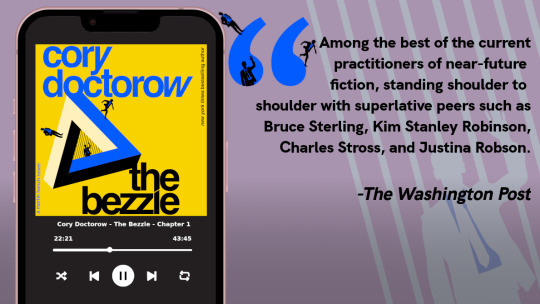
I'm Kickstarting the audiobook for The Bezzle, the sequel to Red Team Blues, narrated by @wilwheaton! You can pre-order the audiobook and ebook, DRM free, as well as the hardcover, signed or unsigned. There's also bundles with Red Team Blues in ebook, audio or paperback.

If you'd like an essay-formatted version of this post to read or share, here's a link to it on pluralistic.net, my surveillance-free, ad-free, tracker-free blog:
https://pluralistic.net/2024/01/17/monopolies-produce-billionaires/#inequality-corruption-climate-poverty-sweatshops
#billionaires#wef#climate#monopoly#world economic forum#competition#antitrust#consumer welfare#inequality#corruption#davos#guillotine watch
220 notes
·
View notes
Text
Lina Khan Gets It Wrong (Again)
by Norman Singleton | Oct 28, 2024
Photo Credit: Paul Morigi, https://www.flickr.com/photos/96739999@N05/53435673057
60 Minutes recently aired an interview with Federal Trade Commission (FTC) Chair Lina Khan conducted by veteran reporter Lesley Stahl. This may have been the first time in their 58-year history that 60 Minutes has profiled an FTC chair, but Lina Khan is not the “typical” FTC chair.
President Joe Biden picked Lina Khan to head the FTC because she is a (maybe the) leading advocate for “neo-Brandeisians.” Named for former Supreme Court Justice (and progressive icon) Louis Brandeis, this movement seeks to restore the “big is de facto bad” approach that dominated antitrust from the passage of the first antitrust laws in the 1890s until the Ronald Reagan administration. The “big is de facto bad” approach was displaced by the consumer welfare standard, which focuses on how businesses’ actions affect consumers.
Stahl questioned Khan about concerns that when government prevents companies from merging, they deprive them of the ability to use economies of scale to lower prices. Khan said, “Even if those efficiencies arise, if the companies are not checked by competition, it won’t have an incentive to pass those benefits on to the consumer because those consumers may not have anywhere else to go.” Khan and her progressive allies fail to consider the history of businesses that believed their position as leader of the market was so untouchable that they could abuse their customers with high prices, poor customer service, and a refusal to adapt to compete with new and innovative competitors.
An example of a seemingly untouchable market leader that failed to “keep up with the times” is Borders Books. Borders’ failure to see the potential in online retail caused the company to lose many customers (and eventually go bankrupt) to an online book retailer that started as one man selling books in a rented warehouse. That company was Amazon.
Khan acknowledged concerns that her aggressive approach to antitrust could make companies reluctant to engage in beneficial mergers or acquisitions because they fear that the time and money they will have to spend justifying the merger to the government will make the transaction unprofitable. However, Khan says those concerns must be balanced by the risk that businesses could grow so big and act so recklessly they could crash the entire economy. This concern ignores the fact that the only case of big business recklessness causing an economy wide meltdown was the subprime crisis of 2007-2008, which was the result of government intervention in the housing market, not “unbridled capitalism.”
5 notes
·
View notes
Note
https://twitter.com/CineGeekNews/status/1735028345794855200
Warner Bros Discovery currently has an over 60% Probability of Bankruptcy.
I honestly am not sure if this is good or bad for the SPN revival. On the one hand, WB is NOT going to want to spend money on such a niche IP (that will really mostly only draw ppl who were already fans) if they are in such dire straits financially. On the other hand, they could bring in money by selling the IP to another studio who would obviously then want to actually do something with it since they spent money on it. But that also depends on another studio or streaming service wanting to do something with it which will be tougher. Netflix would make sense since they currently have SPN for streaming, except they will be losing their streaming rights at the end of 2025. A revival wouldn't even be released until then so why would Netflix want to put money into a revival of show that will, at that time, be streaming on a competitor (most likely Max since it will revert back to WB). Amazon is a possibility since both Jensen and Kripke are there (especially if they want to bring Kripke on for it) and Kripke seems to have some sway over there. But again, unless they buy the rights to SPN to stream on their platform, why would they want to make a show that will inadvertently benefit their competitor?
Thoughts?
https://www.macroaxis.com/invest/ratio/WBD/Probability-Of-Bankruptcy#google_vignette
[full disclosure, I sent this same ask to someone else as well, I'm not trying to spam people with it, I just wanted both your opinions!]
I went cross eyed reading the article, it looks like it was written by an A.I, which is not out of the realm of possibility given how many "journalists" are fired and Sports Illustrated was busted for using AI to write articles.
It really does not take much to avoid bankruptcy. Usually when a company is going to go under, the signs of it are obvious inaction for a long time and it inevitably dooms the business. The prime reason why WBD is not going broke is because they took immediate actions after the merger. What happens is the profitable parts of the business stays, while losses are either "turned around" or the business gets eliminated. Sometimes things like streaming subscribers will drop a quarter or two. Maybe a movie or two never gets released. But housecleaning is far more important than anything right now so that money is not wasted. The result is growing cash flow without losing much of the business.
Remember what I've said that cash flow is king? You can run a non-profitable company indefinitely with positive cash flow, but run a profitable company into the ground without cash flow. AT&T generated next to no cash flow. WBD exists for the very purpose of dismantling the legacy Time Warner conglomerate, that was the intention when AT&T sold it to Zaslav. It’s why they removed HBO from the name of Max. His job is to clean up its balance sheets, prepare its parts for sale, and pay himself handsomely in tune of $200 million last year. I begrudgingly admire Zaslav’s sticking with his controversial strategy, which saw other studios eventually following that same strategy.
By 2023, WBD paid off $12 billion in debt. That was a demonstration of faith by management in the turnaround efforts or else they would have kept the cash "just in case." The interest on the debt alone is eating $2 to $3 billion in free cash flow. Thats a lot of free growth in their bottom line when debt is paid down. Against all odds, WBD's streaming service HBO Max (and then just Max) is creating most of the cash flow improvement with $5 billion in cash flow. Advertising is growing in this segment at a robust pace. That said, the content decline for third-party licensing will have implications now that the strike is over and WBD has to start spending money on new contents on their prized IPs i.e. Lord of the Rings, Harry Potter, DC, etc.
For niche IPs like Supernatural, I see 50% chance of WBD still licensing it to Netflix because third-party licensing is the new king. WBD will also offload low-performing shows in the same bundle with higher-performing Supernatural because it will allow WBD to continue their 'creative accounting' to avoid paying residuals to low-tier actors. Then I can see Netflix doing what they did with Gilmore Girls and produce a revival limited series for Supernatural, which will increase viewership for the OG SPN and continue to help retain subscribers.
On the other hand, WBD is rebooting every niche IP under the sun and I'm pretty certain they will make the same attempt with Supernatural. The strike is over and WBD need to make new contents to attract back subscribers they lost over two quarters during the strike. When SPN goes back to Max in 2025, an announcement of a reboot/revival will mean free marketing from devoted fans and ensure continual interest and viewership of the OG SPN.
20 notes
·
View notes
Text
Wow. It's public now. Saks/Neiman Marcus merger (with a little help from Amazon).
7 notes
·
View notes
Text
Writers Guild West Official: Era of Hollywood Mergers Hastened the Strike
August 10, 2023
Laura Blum-Smith, the Writers Guild of America West’s director of research and public policy, considers the strike a result of a tsunami of Hollywood mergers that has handed studios and streamers the power to its exploit workers.
“Harmful mergers and attempts to monopolize markets are a recurring theme in the history of media and entertainment, and they are a key part of what led 11,500 writers to go on strike more than 100 days ago against their employers,” Blum-Smith said on Thursday at an event with the Federal Trade Commission and Department of Justice over new merger guidelines unveiled in July.
She pointed to Disney, Amazon and Netflix as companies that “gained power through anticompetitive consolidation and vertical integration,” allowing them to impose “more and more precarious working conditions, increasingly short term employment and lower pay for writers and other workers across the industry.” But she sees revisions to the merger guidelines that address labor concerns a key part of the solution to prevent further mergers in the entertainment industry moving forward.
“The FTC and DOJ’s new draft merger guidelines are part of a deeply necessary effort to revive antitrust enforcement,” she added. “Compared with earlier guidelines, the new ones are much more skeptical of the idea that mergers are the natural way for companies to grow. And they focus more on the various ways mergers hurt competition, including how mergers impact workers.”
In July, the FTC and DOJ jointly released a new road map for regulatory review of mergers. They require companies to consider the impact of proposed transactions on labor, signaling that the agencies intend to review whether mergers could negatively impact wages and working conditions. FTC commissioner Alvaro Bedoya, who was joined by agency chair Lina Khan, said in a statement about the guidelines that “a merger that may substantially lessen competition for workers will not be immunized by a prediction that predicted savings from a merger will be passed on to consumers.” Historically, transactions have been considered mostly through the lens of benefits to consumers.
The guidelines lack the force of law but influence the way in which judges consider lawsuits to block proposed transactions. They also tell the public how competition enforcers will assess the potential for a merger’s harm to competition.
Antitrust enforcers have steadily been taking notice of negative impacts to labor as a result of industry consolidation. “We’ve heard concerns that a handful of companies may now again be controlling the bulk of the entertainment supply chain from content creation to distribution,” Khan said last year during a listening forum over revisions to the guidelines, in a nod to anticompetitive conduct by studios that led to the Paramount Decrees. “We’ve heard concerns that this type of consolidation and integration can enable firms to exert market power over creators and workers alike.”
Adam Conover, writer and WGA board member, said in that April 2022 forum that his show Adam Ruins Everything was killed by AT&T’s acquisition of Time Warner in 2018 when TruTV’s parent company forced the network to cut costs. He stressed that a handful of companies “now control the production and distribution of almost all entertainment content available to the American public,” allowing them to “more easily hold down our wages and set onerous terms for our employment.” It’s not just writers that are impacted by an overly consolidated Hollywood either, he explained. After Disney acquired 21st Century Fox in 2019, he said that the studios pushed the industry into ending backend participation and trapping actors in exclusive contracts preventing them from pursuing other work.
Blum-Smith said that aggressive competition enforcement is necessary as “Wall Street continues to push for more consolidation among our employers despite the industry’s history of mergers that failed to deliver any of the consumer benefits they’ve claimed that left writers and audiences worse off with less diversity of content and fewer choices.”
“More mergers will leave writers with even fewer places to sell their work and tell their stories and the remaining companies will have even more power to lower pay and worsen working conditions,” she warned. “Strong enforcement against mergers is essential to protect workers in media and workers across the country and these guidelines are an important step in the right direction.”
2K notes
·
View notes
Note
Please Please I wanna see what's inside Aventurine's magazines! 🥺 Where did you get the magazines from?
Hi nonny! 😽 I bought from second-hand collections and traded face-to-face with local sellers >_< I wanted to share but it seemed like it would be a copyright infringement. Don’t worry, I looked for online purchasing links (including e-book versions) ! I don’t understand Japanese, so I used google translate to take pictures and read them… Let me introduce and recommend to you:
This is the magazine PASH! May 2024. The content is mainly an introduction to each version of HSR + character introduction + Penacony exploration introduction.
amazon, magazine official link

This is anan No.2393 Special Edition! If I have to choose, I highly recommend this magazine!! First of all, the cover is beautiful, and this magazine is mainly for female readers. In it, Aventurine introduces Penacony to you + his interview.
amazon
HSR wiki has this interview content...

This is Weekly Famitsu's merger number No. 1847 on May 9 and 16, 2024. The content is also an introduction to the main HSR game + an introduction to character settings.
amazon

16 notes
·
View notes
Note
saw an ask a while ago about how close team Amazon must’ve been before the whole shitshow went down and it had me thinking do you have any HCs for them behind the scenes?? clearly they talked boys and sex and harassed the living hell out of poor cody
Team Amazon was a legit power team and the unnecessary drama from the love triangle ruined it. So in my world it never happened. Duncan came back but never cheated, never had other feelings, and if anything he and Courtney continued their on again off again shit.
That being said, yes, I do have some HCs about the team ✨
Cody knows so much shit/gossip about other contestants because the of the girls.
The girls definitely give Cody advice on dating, he’s like their little brother so they want to look out for him.
Whenever Sierra is being overly obsessive the girls talk some sense into her. She eventually calms down and is normal for the time being. Cody is eternally grateful 💀
Heather and Courtney take turns leading the team. It’s the only way they can stay sane with each other lmao.
Heather insists everyone needs a proper makeover, especially Gwen, so every time they are in first class she prepares a bunch of self are stuff.
Everyone’s kinda skeptical about Heather’s intentions but she really just wants to have some type of friendship with her team this time.
One night all the girls are talking about their past/current relationships. Sierra keeps cutting in saying she already knows this or that about all of them, but finally shuts up and listens regardless.
One time when Cody is asleep they draw all over his face and Sierra takes pictures on her not-allowed-cell-phone.
Whenever Courtney’s upset about whatever Duncan did this time the girls comfort her, and Cody even steps in trying to give her a guys point of view (he tries at least).
Everyone knows Heather has a thing for Alejandro but she keeps denying it. Whenever the teams merge they try to push the two together in any circumstance.
Even with the merger, team Amazon still looks out for one another. If a challenge involves a teammate they always go to each other until Chris tells them to cut it out and be mean to each other already.
What even is canon? That doesn’t exist in these.
#total drama#team amazon#td courtney#td gwen#td heather#td sierra#td cody#total drama courtney#total drama gwen#total drama heather#total drama sierra#total drama cody
137 notes
·
View notes